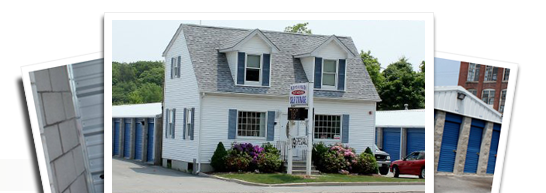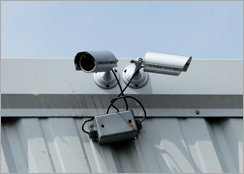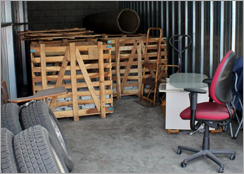

Office Hours
Monday - Friday:
9 a.m. to 5 p.m.
Saturday:
9 a.m. to 2 p.m.
Need More Info?
Please complete the
Request Form on the
Contact Us page.
North Main Self Storage
Service Area
North Main Self Storage provides affordable storage options in Woonsocket, RI serving Blackstone, Burriville, Pascoag, Millville, Franklin, Bellingham, North Smithfield, Cumberland, Slaterville, Manville and Lincoln.
Helping You Keep Your 'Extra Stuff' Safe, Dry & Out of Site.

Storage Tips / Info
• What should / should not be stored in a self storage unit?
• Self storage tips for business owners
• Choose the right size self storage unit
• Packing Tips
North Main Self Storage
750 Winter Street, Woonsocket, RI 02895
Phone: 401-766-2400 | Email: info@northmainstorage.com




Security options for storage If you have more possessions than places to put them, keeping your things secure in a rented storage unit is often a convenient solution. However, it’s important to make sure that your belongings will be not just secure but easily accessible. Security measures vary according to geographic location, facility policy and cost, so here are some things to keep in mind when looking for the right kind of storage for you.
If you have more possessions than places to put them, keeping your things secure in a rented storage unit is often a convenient solution. However, it’s important to make sure that your belongings will be not just secure but easily accessible. Security measures vary according to geographic location, facility policy and cost, so here are some things to keep in mind when looking for the right kind of storage for you.
Locks & Security Systems
Although no security system is totally foolproof, there are security features that the facility should have to make sure both you and your stored items are as safe as possible:
- When possible, choose a property that well lit. This is especially important if you will be accessing your storage unit when it’s dark, or at times when no managers are on duty.
- You will have the only key to your individual lock.
- Finally, there are video cameras throughout the property.
Monday – Fri 9AM -5PM
Sat 9AM – 2PM
Deliveries
If you’re a business owner, and will need to have deliveries accepted at the self-storage unit, there are several additional questions you should ask before renting a storage unit:
2. Are deliveries limited to specific times and days?
3. If deliveries are accepted, can they be delivered right to your storage unit?
4. If they can be delivered right to your storage unit, what is the maximum size of the delivery trucks that can enter the property and drive up to your unit?
5. Does the property manager need to be present or can the delivery be made without the manager there?
The peace of mind that comes from secured storage is an important benefit for both individuals and business owners, but security policies can become a hassle if you don’t know what you’re signing up for. Take the extra step to investigate the security options available at the storage facility of your choosing, and maximize the convenience of your storage solution.
What should or should not be stored in a self storage unit?
Self-storage is an excellent option for storing overflow of many different types of materials from your home or business. You can think of your storage unit as a second garage or business supply room.
When planning what to store in your unit, whether for business or personal purposes, consider that all storage facilities have restrictions on what they will allow you to store on their premises. This is for the protection of not just you and your belongings, but the facility staff and other customers and their goods. You will be required to sign a lease indicating that you understand and agree to adhere to the rules and restrictions for what items are allowable. As a general rule, any item or material that is considered “inherently dangerous” will not be allowed.
Combustible, Hazardous or Toxic Materials Are Not Permitted
 Vehicles, Boats, Motorcycles, & Recreational Equipment
Vehicles, Boats, Motorcycles, & Recreational Equipment
Storing vehicles is generally acceptable, as long as they are insured and in operational condition. Items you can store are not limited to cars, minivans, suvs, trucks, jet skis, snowmobiles, motorcycles, ATV's, boats, dirt bikes, etc. Please call us for more details.
Medical/Pharmaceutical Supplies & Equipment
If you are a sales representative, you may find a self-storage unit a convenient place to manage medical supplies and pharmaceutical samples. It is a useful way to keep your products organized and easily accessible without cluttering up your office or filling your car trunk. While most supplies are acceptable, radioactive equipment – or anything that contains radioactive materials – cannot legally be stored.
Construction Equipment
If you work in construction, it can be convenient to stop by the storage unit on the way to the site and pick up the equipment you need.
Perishable Food and Animal Products
Canned foods can be stored in storage units, but perishable food products such as cereals, produce or meats are not allowed. These may spoil or attract pests.
Miscellaneous Prohibited Items
Any animals or plants cannot be stored. Nor can any stolen items. People are not allowed to live in storage units.
If you have any questions about the items you wish to store, consult the manager of the self-storage facility before you pack and arrive at the site.
Self storage tips for business owners
A cramped workspace can make it difficult to find what you need, distracting you from business at hand. Excess inventory, samples, supplies and paperwork tend to pile up quickly in small spaces, requiring extra effort to keep things organized. You may have considered renting additional commercial space or trying to squeeze more room in your home-based office, but were put off by the cost and loss of valuable time to planning and construction. That’s why, for today’s businessperson, self-storage is a cost effective and efficient solution.
At North Main Self Storage, we find that most of our business owners make use of self-storage not just for long-term, but also short-term solutions.
• During remodeling, redecorating, or downsizing your business
• When relocating your business
• Storing seasonal furnishings such as patio furniture, grills, outdoor kiosks, etc.
• Storing excess inventory before the start of the holiday season
• Delivery of materials
Essentially, a storage unit can function much like an extra office. Take advantage of these tips to get the most of our investment:
When you’re planning how you will pack your items, consider how frequently you plan to access them. Some packing methods are much easier to change as necessary, and less messy to work with.
 Choose the right size self storage unit
Choose the right size self storage unit
Estimating how much space you will need for your storage items can be simple if you know what you want to store. Here are some simple steps to help you plan, and size recommendations based on commonly-stored items. Click on the Size Chart icon to the right or the following link to visit Our Storage Size Chart.
 Step 1: Start by making a list of the items you plan to store. Or, also make a video of the items you plan to store.
Step 1: Start by making a list of the items you plan to store. Or, also make a video of the items you plan to store.
Step 2: Group the items according to how you will organize them.
Start by identifying items that will be packed in boxes and stacked. Next, prioritize boxed items you will want to access most frequently (they’ll go closer to the front of the unit). Then group by fragility or weight – heavier, sturdier items should be stored on the bottom of stacked items, fragile items on top. Then consider awkwardly-sized items that won’t stack well, including how often you will need to use them, and how heavy they are.
Step 3: Make note of how these items will be packed and organized.
Boxes and containers should be of uniform size, and should be stacked no more than three- or four-high, depending on the size and strength of the containers you use. At North Main Self Storage, our customers often use heavy-duty plastic stackable drawers for easy access to stored items.
There are several basic sizes of storage units. Below is a quick-reference guide to help you plan what size unit you will need for your personal or business storage:
Storage of Personal Items
- 5' x 5' (25 sq. ft.) – Will hold a chest of drawers, a small mattress set, boxes and small items. Useful for garden tools, or seasonal decorative items.
- 5' x 10' (50 sq. ft.) – Will hold furnishings of a mid-size bedroom, including a queen-size bed, dresser, TV, and a few storage boxes.
- 10' x 10' (100 sq. ft.) – Will hold the contents of an entire family room or two full bedrooms.
- 10' x 15' (150 sq. ft.) – Will hold the contents of up to three bedrooms in this unit. Recommended for larger items such as pianos, couches, tables, or large-screen TVs.
- 10' x 20' (200 sq. ft.) – Will hold the contents of a five-bedroom house, including a refrigerator,
washer/dryer, dining room table, chairs and large boxes. - 10' x 30' (300 sq. ft.) – Will hold the contents of a 5- to 7-bedroom house, including large items such as a couch, bed, fridge, and entertainment center.
Storage of Business Items
- 5' x 5' (25 sq. ft.) – Will hold the contents of a large office closet filled with files, books, office chairs, and a few storage boxes.
- 5' x 10' (50 sq. ft.) – Will hold the contents of one office room, including desks, bookcases, filing cabinets and large storage boxes. Ideal for storing equipment and tools.
- 10' x 10' (100 sq. ft.) – Will hold the contents of an entire office, including desks, chairs, computers and a few storage boxes.
- 10' x 15' (150 sq. ft.) – Will hold the contents of three office rooms could fit in this size unit, including several desks, computers and boxes.
- 10' x 20' (200 sq. ft.) – Will hold the contents of five office rooms (desks, computers, bookcases and file cabinets) in this size, or a five-year supply of business and tax files.
- 10' x 30' (300 sq. ft.) – Will hold the contents of five office rooms – many desks, several large boxes, seasonal storage, a few sets of large storage shelves and/or a few pallets of inventory, depending on how high you stack them.
It is always a good idea to visit potential storage units to get a visual sense of the space you will be working with.
Your storage representative can answer any questions you may have, and give you suggestions on how to store your items to maximize space.
Packing Tips
1. Make packing for storage easier on yourself by planning ahead. Start by listing all the items you're going to store and their approximate sizes. Also, gather up plenty of sturdy, corrugated cartons, packing paper, bubble wrap, sealing tape and marker pens, along with any furniture covers or shelving you intend to use in your storage unit.
2. Pack as much as you can in the same size boxes. Fill boxes tightly, but take care to neither over pack nor under pack. (Bulging cartons tip when stacked, while half full boxes tend to collapse). Use wadded up newsprint, bubble wrap, rags, towels, or blankets to fill in empty spaces. For maximum protection, seal cartons with tape.
3. Pack heavy items such as books and tools in small boxes. For easier handling limit the weight of all cartons, regardless of size, to 30lbs. or less.
4. Label all boxes. Clearly label boxes so you know their contents, and keep a list (as well as pictures and descriptions) at your home or office for reference. Mark clearly all boxes containing fragile items.
5. Clean and dry appliances before storing. Secure all movable parts with paper, or wedge and wrap a paper pad around each item for protection. During transport tape all doors shut, but remember to wedge them open for storage.
6. Tape or tie bed rails together. Mark the pieces for easier assembly later. Place covers or plastic bags on mattresses to keep them clean during storage.
7. Pack books flat to protect their spines. Line cartons with plastic and fill empty spaces with packing paper.
8. Use bureau drawers to store small, fragile items. Secure items in drawer by filling empty spaces with towels or packing paper.
9. Protect chair legs by wrapping them in packing paper. Leave slipcovers on upholstered chairs and cover them with plastic chair covers.
10. Hang clothes and draperies in wardrobe boxes.
11. Use lots of paper to pack dishes and glassware. Place a layer of packing paper inside the bottom and top of cartons. Wrap each dish and glass separately and cushion them with crumpled paper. Plates are best stacked on edge.
12. Pack lamps and lampshades in individual boxes. Use plenty of clean paper or clothing for padding.
13. Pad mirrors and paintings with paper. Place them in special mirror packs or large boxes; mark boxes
North Main Self Storage
750 Winter Street
Woonsocket, RI 02895
